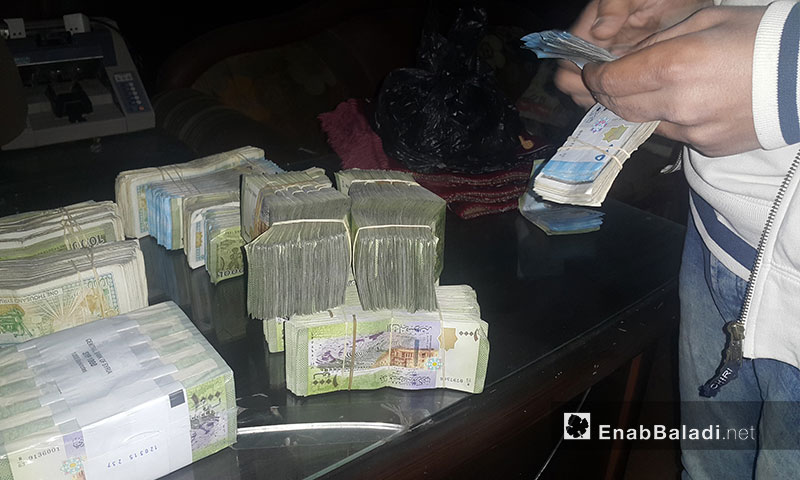
Traders Accused of
Commissions of Money Transfer have quadrupled in Ghouta

Enab Baladi- Eastern Ghouta
Mohammed Mohammed, an expatriate in Saudi Arabia, describes the “foolish increase” of the commissions of money transfer that is happening in Ghouta as a “crime”, accusing traders of “exploiting the regime’s siege of citizens.”
Commissions of money transfer in Eastern Ghouta have increased four times more than they were before the siege tightening. This was mainly caused by the ongoing battles east of the capital since last February and the closure of most of the tunnels leading to Ghouta. The citizens are afraid of a higher rise that would reduce the value of the transferred amounts of money.
There are about 60 money exchange offices in the cities and towns of Ghouta, six of which are trusted by the citizens, since they are owners of large capital, who depend on them basically.
Daily Commission Increase
The office commission on money transfer increased from 5 to 20 percent until Saturday 22 April. Mohammed says he agreed with one of the offices to take a commission of 20,000 Syrian Pounds on the amount of 1,000 Saudi Riyals he sent to his family in Ghouta. He explained “I was surprised to find the office taking 25 thousand pounds, attributing the reason to the daily changes in commission rates.”
Mohammed was two days late to inform his family about the necessity of receiving the amount of money, as explained in an interview with Enab Baladi, indicating that the office owner “informed me that the commission is calculated in terms of the price of the day of sending the notice and not the date of deposit.”
Exchange Offices Explain What is Going On
Anas Mohammed, who owns a money exchange office in Eastern Ghouta, says in an interview with Enab Baladi that the commission rate increased after the closure of the tunnels. He attributes the reason to traders of food and tobacco “who have huge sums of money and who made of the currency market a bigger profit gate.”
While all money transfer reach Turkey, regardless of the country they are coming from, before being transferred to Syria, in some cases amounts of money go through Lebanon and Jordan, then directly reach Damascus.
Explaining what traders offer to exchange offices’ owners, Mohammad says: traders dispense 500 thousand Dollars, for example, and present them as money transfers with 15% commission. He points out that some, including some institutions operating in Ghouta, have been forced to obey and increased the rate of the commission to 1%.
Two months ago, the exchange offices received 130 thousand Syrian Pounds from a money transfer of one thousand Saudi riyals, but today they decreased to 100 thousand, according to the owner of the office. He believes that the most affected ones are “institutions that received reduced value of money” in addition to individuals who depend on monthly salaries from outside Ghouta.
Monetary Siege
Abdullah al-Shami, an economist and a member of the board of the Duma “Charitable Society”, said that forms of the siege had increased earlier, and for the first time they reached the monetary bloc. He attributes the reason, in an interview with Enab Baladi, to “the absence of the central economy in Ghouta”.
According to al-Shami, the centralization of the economy cannot be achieved, especially with emerging institutions and organizations that have not yet reached a stage where they can centrally manage the monetary process. He points out that “Ghouta is a small area that has no connection with the external borders, and is therefore directly linked to the economy of the Syrian regime.”
The level of the monetary siege’s impact varies according to the institution. According to the economist, “the large institutions are still operating until today, while the emerging ones almost completely ceased to work, and cash becomes subject to a closed cycle in Ghouta.”
The Ghouta market with its monetary bloc is considered weak and that has led to rapid changes in prices and to a rapid impact on the prices of the market goods, according to al-Shami. He confirms also that the services provided to beneficiaries, including institutions, decreased by 70%, with the suspension of monetary blocs from abroad.
Al-Shami agrees with the owner of the exchange office. He said “some traders offer prices the way they want, taking advantage of the bad situation. They benefit from the money provided for the support of services, since about 20 percent of which goes to the trader”.
Solutions Under the Siege
According to the economist, it is wrong to comply with traders. Instead, it is necessary to look for an alternative or for a compressed internal economic cycle between the big institutions and the basic movement in Ghouta market. He asserts also that “it is necessary to search for a particular mechanism, and substitute cash exchange with the interrelationships with the large institutions in Ghouta, which would preserve the monetary bloc it owns meanwhile a change of situation could occur.
The main responsibility of the siege remains that of international organizations, including the United Nations in the first place, according to al-Shami. He considers that “it is supposed to interfere in the besieged areas since service organizations in Ghouta remain financially weak after all “.
Ghouta received hundreds of thousands of dollars a day in 2014 through smugglers who transferred them to the expatriates’ camp, near Duma. They deal with people who have connections with Damascus offices, who in their turn take “royalties” for handing over the money in the camp.
Despite the dangers of the money transfer, they continued to enter the Ghouta. At that time the transfer commission for offices ranged between 3 and 4% and was distributed between the deliverer to the camp, the dealer with the offices of Damascus, and the office in Ghouta.
After the opening of the tunnels, there were delegates to the owners of the Ghouta transfer offices in Barzeh. The incoming monetary bloc increased reducing the commission rate to 1% in light of competition between the offices, which has continued since the beginning of 2015 until it increased about two months ago.
There is no radical solution to control the cash transaction in Ghouta. A board member of the “Charity Society” talks about coordination between the institutions and the governorate council to solve the issue. The member adds “the main request is that international institutions should put an end to the siege of the regime since it is the cause of what we are going through now.”
Enab Baladi’s respondents share a common attitude on the need to “criminalize” and to make those who exploited the operations of transfer accountable, because they affected not only institutions but also individuals, not to mention the “foolish” increase in food prices. Many expected indeed an increase in commission rates in the next few days.
if you think the article contain wrong information or you have additional details Send Correction
النسخة العربية من المقال
-
Follow us :
Most viewed
- Al-Sharaa names new Syrian government
- Intentions for popular resistance amid Israeli escalation in southern Syria
- Kurdish Protection Units: Key point of contention between Damascus and SDF
- Syrians look forward to visiting graves of "martyrs" on Eid morning
- Eid clothing prices rise in Idlib: Predominantly priced in dollars

















 A
A
A
A
A
A



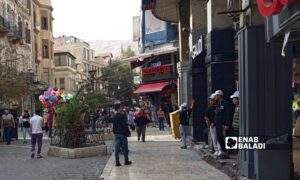
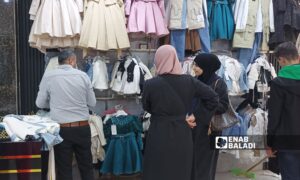
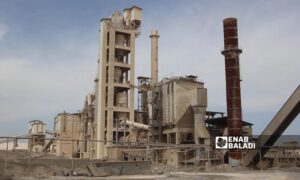
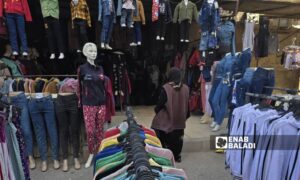

 More Economy
More Economy